Top 12 Crypto Wallets in 2024
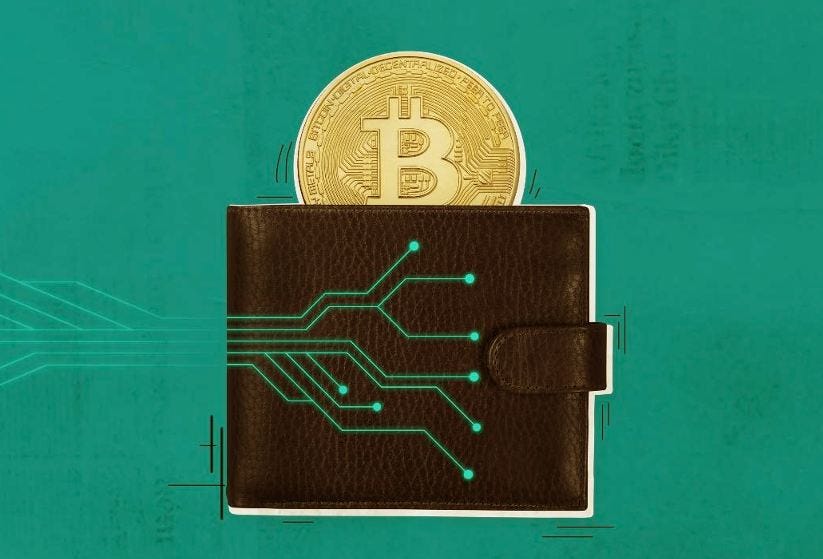 Cryptocurrency wallets are an essential part of the crypto ecosystem. No matter what type of wallet we are talking about, it is always a gateway to all the things one might want to do with their digital assets: use them in dApps, buy NFTs or traditional products and services, or trade on cryptocurrency exchanges.
Cryptocurrency wallets are an essential part of the crypto ecosystem. No matter what type of wallet we are talking about, it is always a gateway to all the things one might want to do with their digital assets: use them in dApps, buy NFTs or traditional products and services, or trade on cryptocurrency exchanges.
Hello! I’m Zifa, a writer and long-time cryptocurrency enthusiast. In this article, I’ll walk you through the best crypto wallets, analyzing their pros and cons to help you make a well-informed decision in the dynamic world of cryptocurrencies. Let’s dive in and explore together!
And if you have already found your best crypto wallet and want to use it, you can trade cryptocurrencies like Ethereum or Bitcoin on Changelly, benefiting from low fees and great fees.
Top Picks for the Best Crypto Wallet — A Quick Look
Here are the custodial and non-custodial wallets that I consider to be the best on the market, having tested them in the past.
- MetaMask: The best Ethereum wallet
- Exodus: Overall best cryptocurrency wallet
- Coinbase Wallet: The best crypto wallet for beginners
- ZenGo: The most secure crypto wallet
- LedgerNano X: The best cold storage wallet for beginners
- Trezor Model T: The best Bitcoin hardware wallet
- MyEtherWallet: The best crypto wallet app for ETH
- BCVault: The most secure crypto hardware wallet
- Enjin: The best crypto wallet for NFTs
- Edge: The easiest-to-use mobile wallet
- Coinomi: The best Bitcoin hot wallet
- Noone Wallet: The Most Versatile Free Wallet for Crypto Trading & Secure Storage
Compare the Best Cryptocurrency Wallets
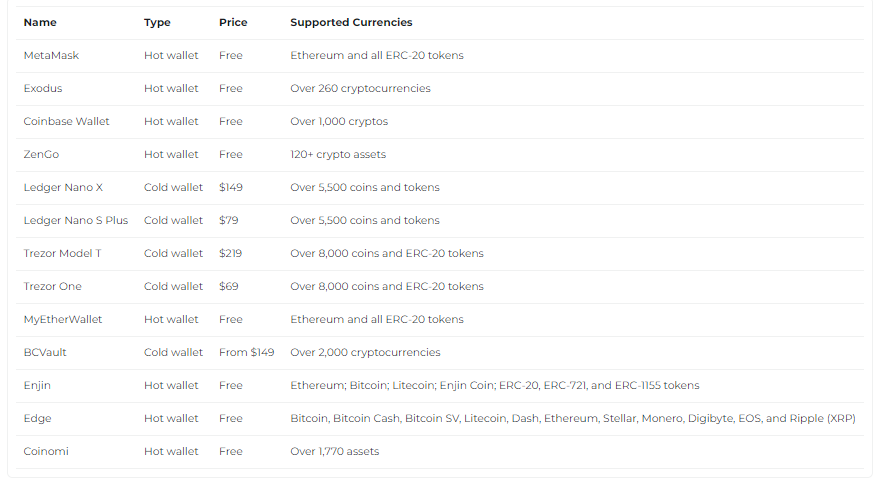
12 Best Crypto Wallets
Here are 12 of the best cryptocurrency wallets available right now.
MetaMask: The best Ethereum wallet
 MetaMask mobile app
MetaMask mobile app
Type: Software wallet (hot wallet)
Price: Free
Supported Cryptocurrencies: Ethereum and all ERC-20 tokens
Website: metamask.io
MetaMask is one of the most popular Ethereum wallets and is often referred to as a gateway to the world of decentralized apps (dApps). It is a browser extension, which means it’s always at your fingertips, integrated into your online experience.
As a hot wallet, MetaMask facilitates real-time transactions, allowing you to interact with dApps on the Ethereum blockchain network directly from your browser. Despite being a software wallet, it offers robust security features that include seed phrase backups and password encryption.
However, keep in mind that, like all hot wallets, MetaMask is still vulnerable to online attacks. If you hold substantial amounts of crypto or if you are particularly security conscious, a hardware wallet (a cold wallet) might be a better fit for you.
We reviewed Metamask in this article.
Exodus: Overall best cryptocurrency wallet
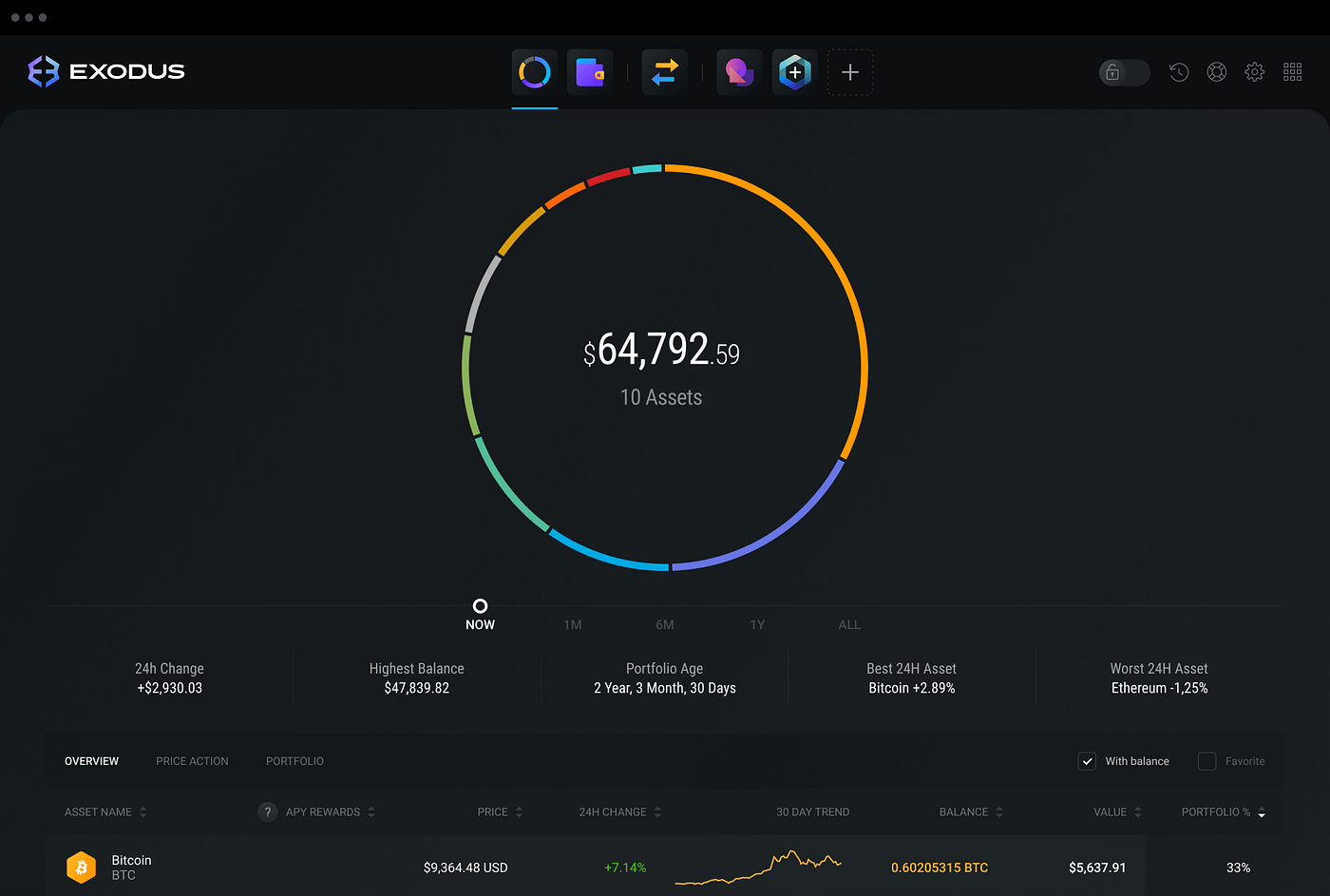 Exodus wallet
Exodus wallet
Type: Software wallet (hot wallet)
Price: Free
Supported Cryptocurrencies: Over 260 cryptocurrencies, including Bitcoin, Ethereum, and Litecoin
Website: exodus.com
Exodus is a user-friendly software wallet that is perfect for beginners. It has a beautiful and intuitive interface that visualizes your crypto portfolio in a pie chart, making it one of the easiest-to-use Bitcoin wallets around.
Exodus supports a wide range of cryptocurrencies and also offers a built-in crypto exchange for seamless trading. This feature, coupled with excellent customer support, makes Exodus a strong contender for your digital wallet needs.
While Exodus encrypts your private keys and transaction data on your device, it doesn’t offer two-factor authentication (2FA), a feature you might want to consider for enhanced security.
Coinbase Wallet: The best crypto wallet for beginners
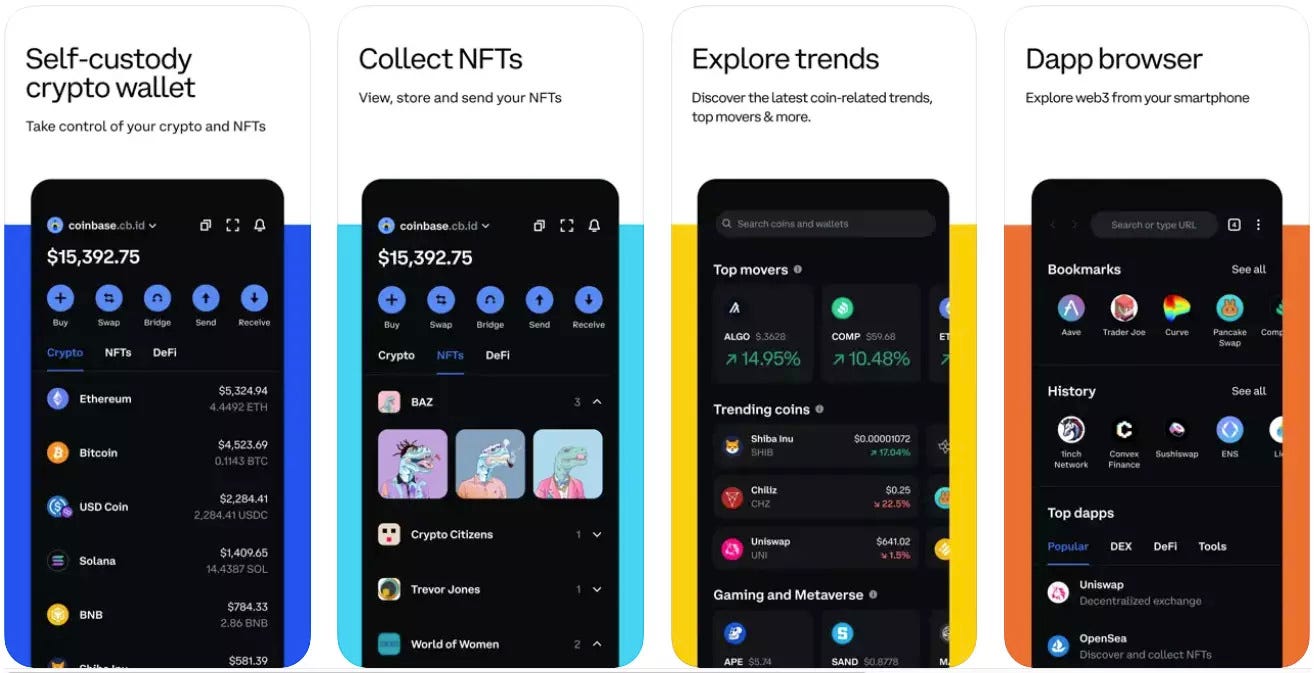 Coinbase mobile app
Coinbase mobile app
Type: Mobile wallet (hot wallet)
Price: Free
Supported Cryptocurrencies: Bitcoin, Ethereum, and thousands of different cryptocurrencies
Website: coinbase.com/wallet
Coinbase Wallet is a stand-alone app, separate from the Coinbase exchange. It allows users to store their cryptocurrencies and explore the world of decentralized apps (dApps). With its user-friendly interface, it’s an excellent option for beginners and seasoned crypto enthusiasts alike.
The Coinbase Wallet provides you with full control over your private keys, which are secured using Secure Enclave and biometric authentication technology. It also features a decentralized exchange, allowing you to maintain control over your funds while trading.
As a hot wallet, it is still more susceptible to online attacks than cold wallets. However, its security features make it one of the safer hot wallets available.
For an in-depth look at Coinbase wallet’s security features, you can read our detailed review here.
ZenGo: The most secure crypto wallet
 ZenGo mobile app
ZenGo mobile app
Type: Mobile wallet (hot wallet)
Price: Free
Supported Cryptocurrencies: Bitcoin, Ethereum, Binance Coin, and 120+ other crypto assets
Website: zengo.com
ZenGo is a pioneering mobile wallet that offers an innovative keyless security infrastructure, thus eliminating the most common cause of crypto theft — key loss. Despite being a hot wallet, ZenGo uniquely blends user-friendliness and advanced security.
ZenGo uses facial biometrics and your mobile device for account recovery, making it a game-changer in crypto wallet technology. Thanks to this feature, it is one of the safest crypto wallets among mobile-based options.
However, like other hot wallets, it is still more susceptible to online threats compared to hardware or cold storage wallets.
Ledger Nano X and Ledger Nano S Plus: Best crypto hardware wallet for beginners
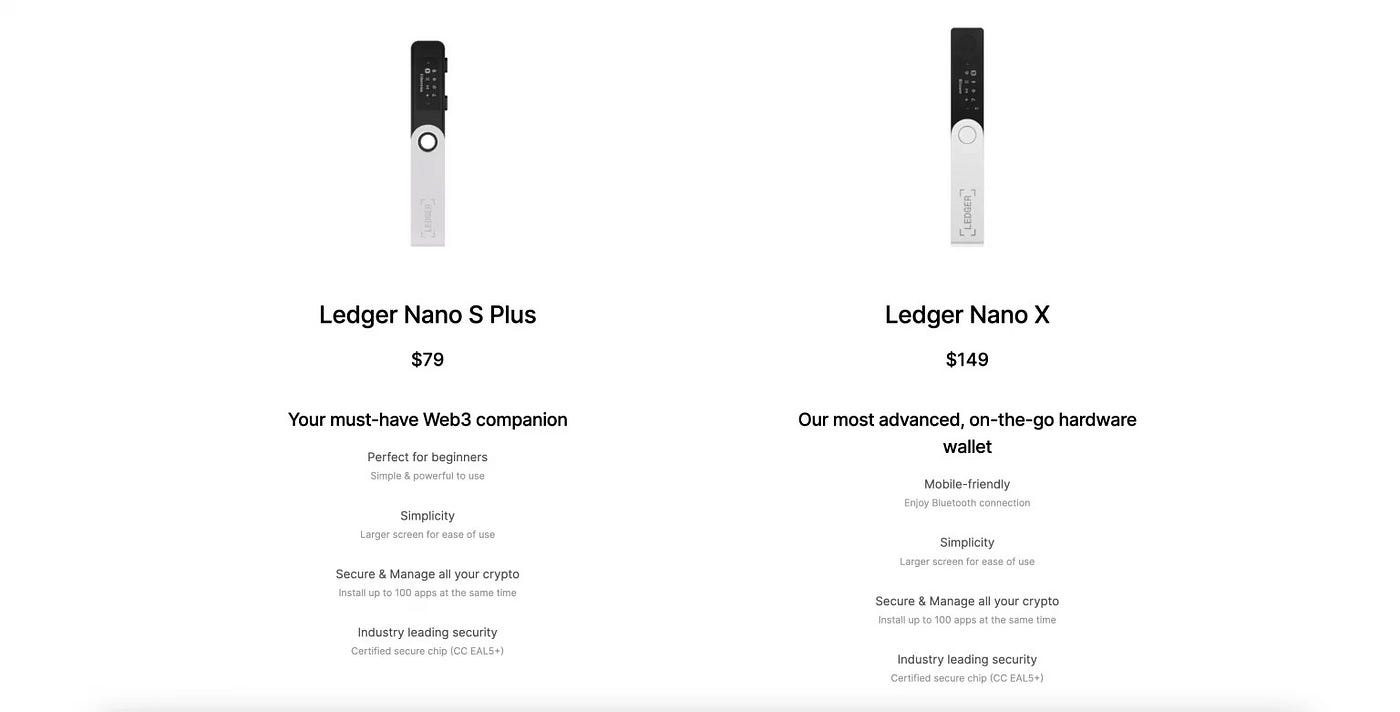 Ledger Nano S Plus vs. Nano X
Ledger Nano S Plus vs. Nano X
Type: Hardware wallet (cold wallet)
Price: Ledger Nano X — $149, Ledger Nano S Plus — $79
Supported Cryptocurrencies: Over 1,800 cryptocurrencies
Website: ledger.com
Being one of the leading hardware wallets on the market, Ledger Nano X provides the safety of cold storage combined with the convenience of a hot wallet with the help of Ledger Live. With the capacity to hold a high number of different cryptocurrencies, it’s a worthy contender for the safest crypto wallet title.
Nano X connects to your device via Bluetooth, allowing you to send and receive cryptocurrencies even on the go. It’s the more expensive sibling of Ledger Nano S Plus, which doesn’t offer Bluetooth connectivity but still provides top-tier security at a lower price point.
Both Ledger devices excel in security. They store your private keys offline, ensuring your crypto stays safe even if your connected device is compromised.
Trezor Model T and Trezor One: The best Bitcoin hardware wallet
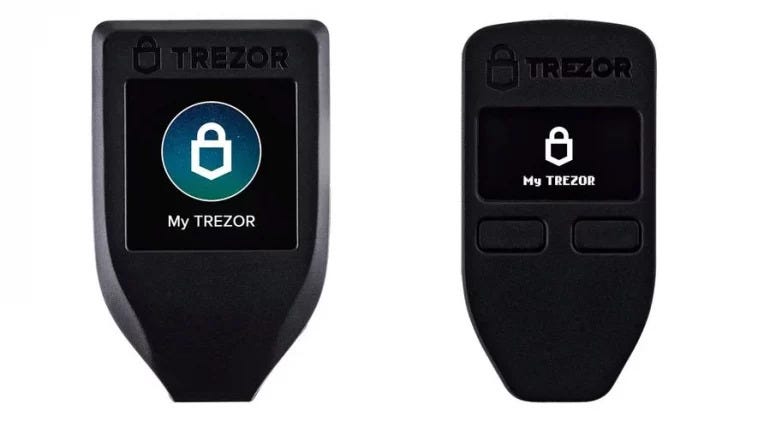 Trezor Model T and One.
Trezor Model T and One.
Type: Hardware wallet (cold wallet)
Price: Trezor Model T — $219, Trezor One — $69
Supported Cryptocurrencies: Over 1,600 cryptocurrencies
Website: trezor.io
The Trezor Model T is a premium hardware crypto wallet that supports a vast array of cryptocurrencies. Its advanced features, like the touchscreen and support for more crypto coins, make it stand out from the crowd.
The Trezor Model T includes a handy touch screen, making it easier to manage your coins. Its younger sibling, the Trezor One, is packed with fewer features but provides the same high level of security at a more affordable price.
Both Trezor models provide offline storage, ensuring your private keys never leave the device, offering you the best form of crypto security — cold storage.
Ledger and Trezor are two leaders in crypto cold storage. We compared them in this article.
MyEtherWallet: The best hot crypto wallet for ETH
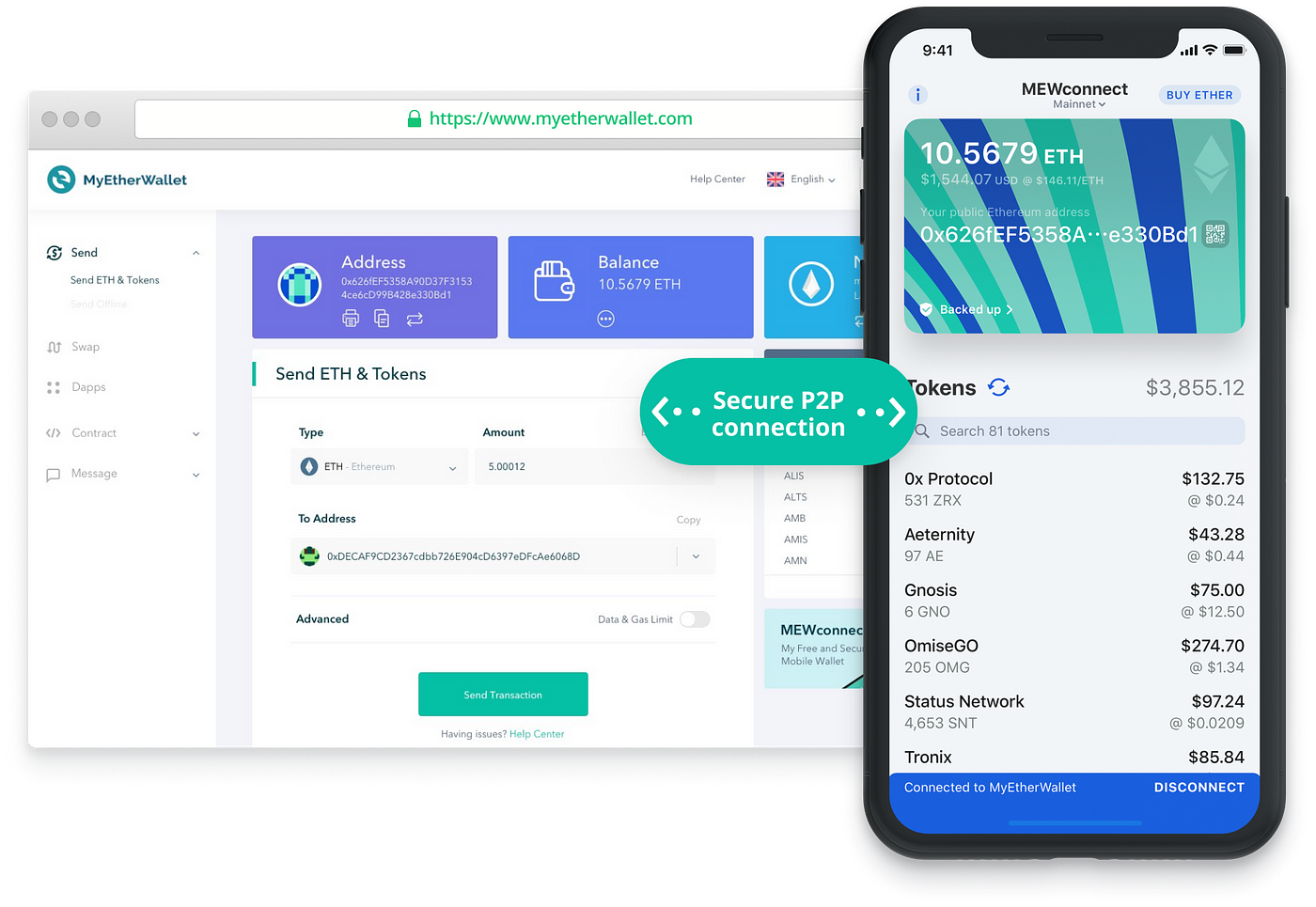 MEW interface
MEW interface
Type: Software wallet (hot wallet)
Price: Free
Supported Cryptocurrencies: Ethereum and all ERC-20 tokens
Website: myetherwallet.com
MyEtherWallet, or MEW, is a free, open-source hot wallet that focuses on Ethereum and ERC-20 tokens. You can create a wallet in minutes and interact with the Ethereum blockchain for services like swaps and purchases.
Though it’s a hot wallet, it’s one of the safer web-based options out there. MEW lets you connect a hardware wallet, allowing you to keep your keys in a secure, offline environment while still enjoying the user-friendly interface of MEW.
Even though MEW offers a balance of convenience and security, as with all hot wallets, you should be aware of online threats and consider using a hardware wallet for large holdings.
We also compiled a list of the best Ethereum wallets. Visit this page to learn more.
BCVault: The most secure crypto hardware wallet
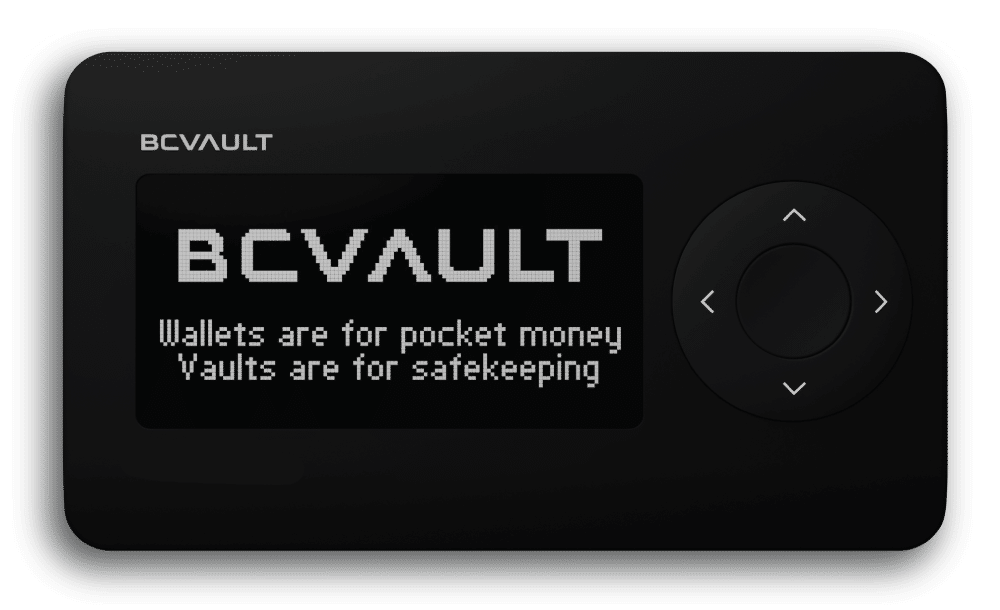 BC Vault One
BC Vault One
Type: Hardware wallet (cold wallet)
Price: $149+
Supported Cryptocurrencies: Bitcoin, Ethereum, Ripple, Litecoin, and 2,000 others
Website: bc-vault.com
BCVault is a hardware wallet that differentiates itself from others by using encrypted storage instead of a recovery phrase. It allows you to securely manage over 2,000 cryptocurrencies, and every wallet is encrypted separately.
It features a random number generator for private keys, which makes your wallet even harder to hack. The device can also act as a U2F (Universal 2nd Factor) hardware token, which grants an additional layer of security.
However, this hardware wallet is more expensive than many others on the market. Its unique features make it a strong contender for the title of the safest crypto wallet, but its price may not make it the best choice for beginners.
Visit this page for our BCVault wallet review.
Enjin: The best crypto wallet for NFTs
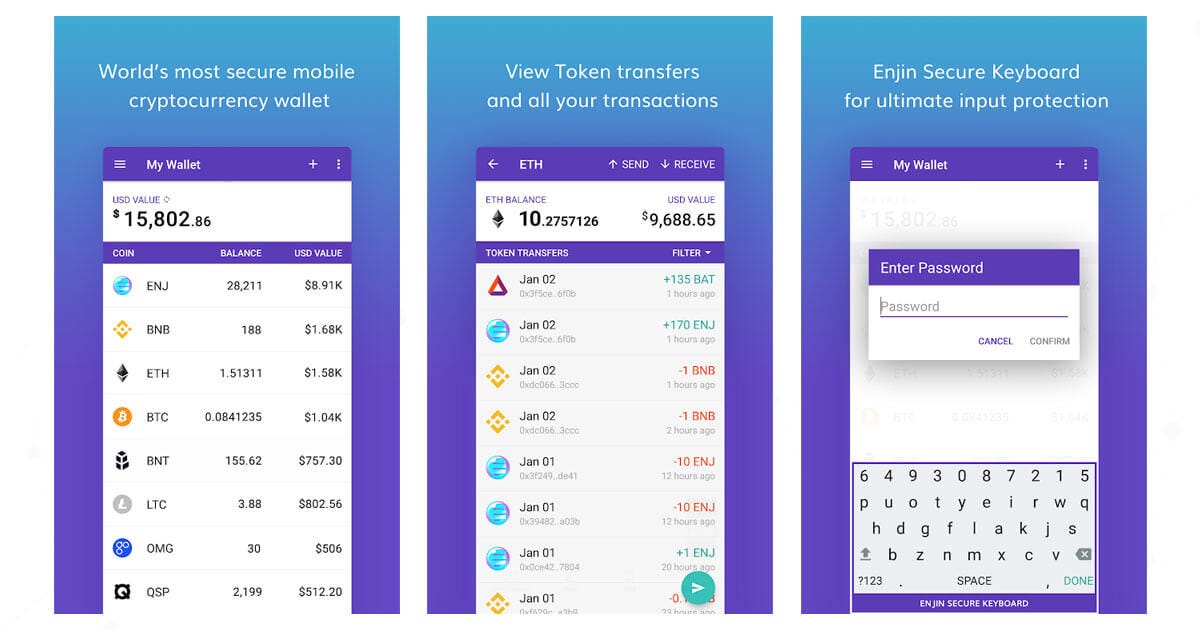 Enjin wallet
Enjin wallet
Type: Mobile wallet (hot wallet)
Price: Free
Supported Cryptocurrencies: Bitcoin; Ethereum; Litecoin; Binance Coin; Enjin; ERC-20, ERC-721, and ERC-1155 tokens
Website: enjin.io/products/wallet
Enjin is a mobile cryptocurrency wallet known for its security, privacy, and clean user interface. The Enjin wallet excels in storing a variety of cryptocurrencies and digital assets, including collectibles or NFTs (non-fungible tokens).
Enjin is one of the best Bitcoin wallets for mobile users, offering robust security features like hardware-level security (Enjin Secure Keyboard), two-factor authentication, and fingerprint login.
While it provides secure hot storage for your assets, remember it’s not as safe as cold storage. Hence, for storing large amounts of cryptocurrencies, you might want to consider a hardware wallet.Curious about other best wallets for NFT? Visit this page to see more options.
Edge: The easiest-to-use mobile wallet
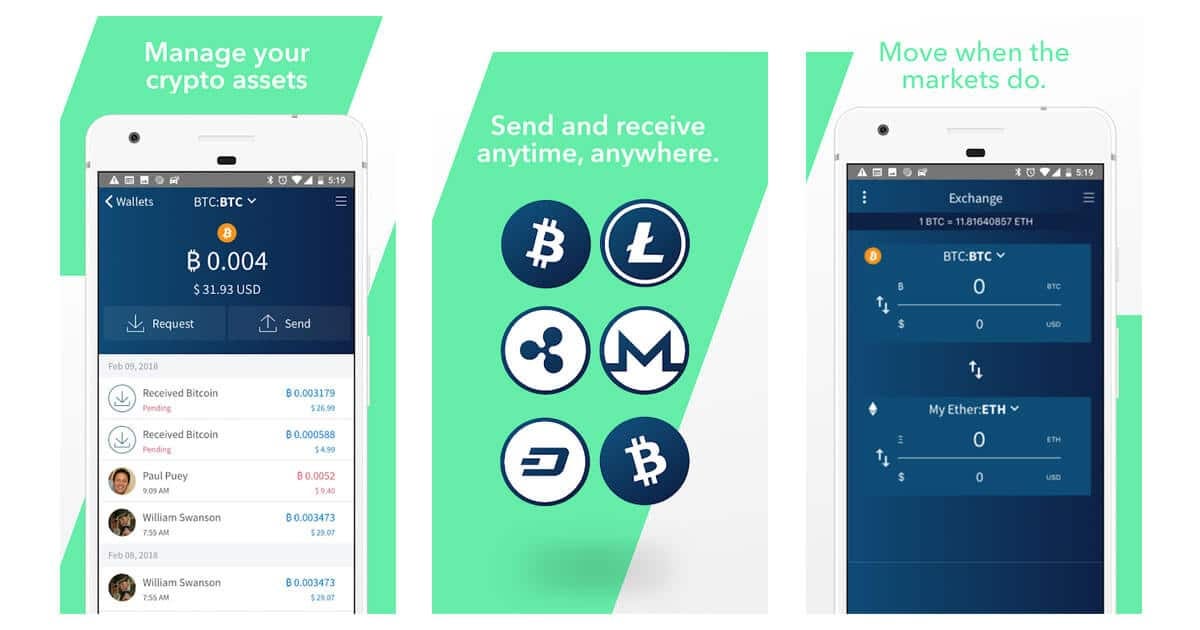 Edge mobile wallet app
Edge mobile wallet app
Type: Mobile wallet (hot wallet)
Price: Free
Supported Cryptocurrencies: Bitcoin, Ethereum, Litecoin, Bitcoin Cash, Monero, and many more
Website: edge.app
Edge is a user-friendly mobile wallet renowned for its robust security measures and excellent user interface. Formerly known as Airbitz, Edge supports several popular cryptocurrencies, making it an ideal Bitcoin wallet for users with diverse portfolios.
Edge features client-side encryption, meaning your personal information, transaction data, and crypto assets are kept secure on your device. The wallet also offers two-factor authentication for an extra layer of protection.
Despite being a hot wallet, Edge implements remarkable security features. However, remember that cold storage wallets are the safest for holding large amounts of cryptocurrencies.
Coinomi: The best Bitcoin hot wallet
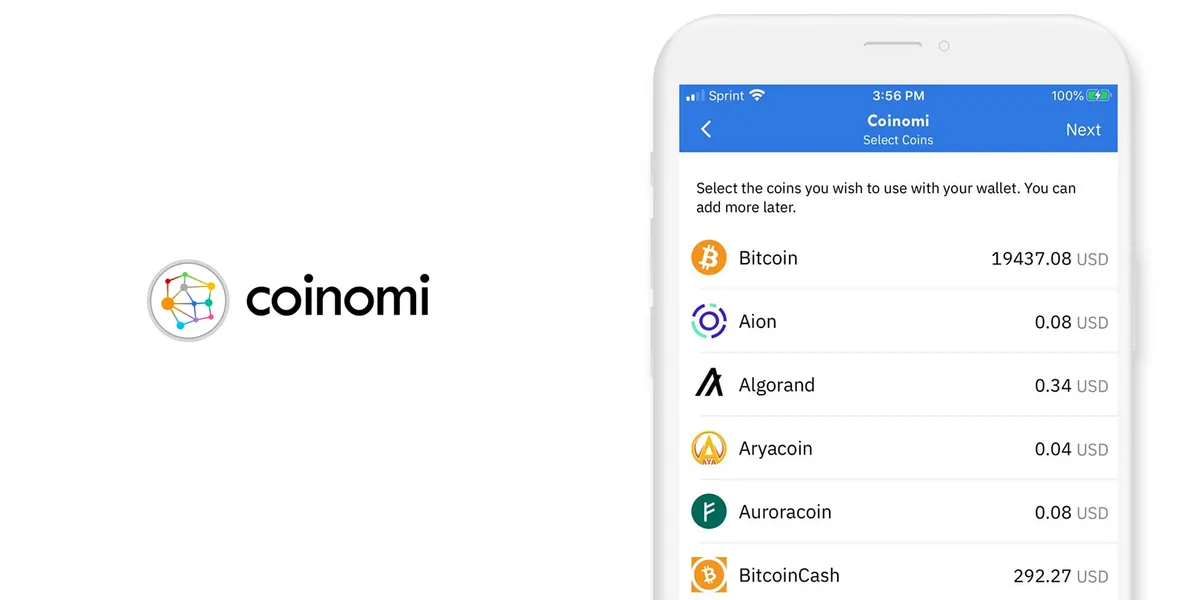 Coinomi app
Coinomi app
Type: Mobile/Desktop wallet (hot wallet)
Price: Free
Supported Cryptocurrencies: Supports over 1,770 assets, including Bitcoin, Ethereum, and altcoins
Website: coinomi.com
Coinomi is a well-established cryptocurrency wallet available on multiple platforms. Known for its versatility, it supports a vast range of cryptocurrencies and allows for the seamless exchange of assets within the app.
For a hot wallet, Coinomi provides robust security features, including strong encryption and IP masking. It is one of the few wallets that allow the user to handle private keys. Besides, Coinomi gives you the option to set custom transaction fees.
While Coinomi boasts top-notch security for a hot wallet, it’s crucial to remember that hardware wallets, which provide cold storage, have the best security for large amounts of cryptocurrencies.
Noone Wallet
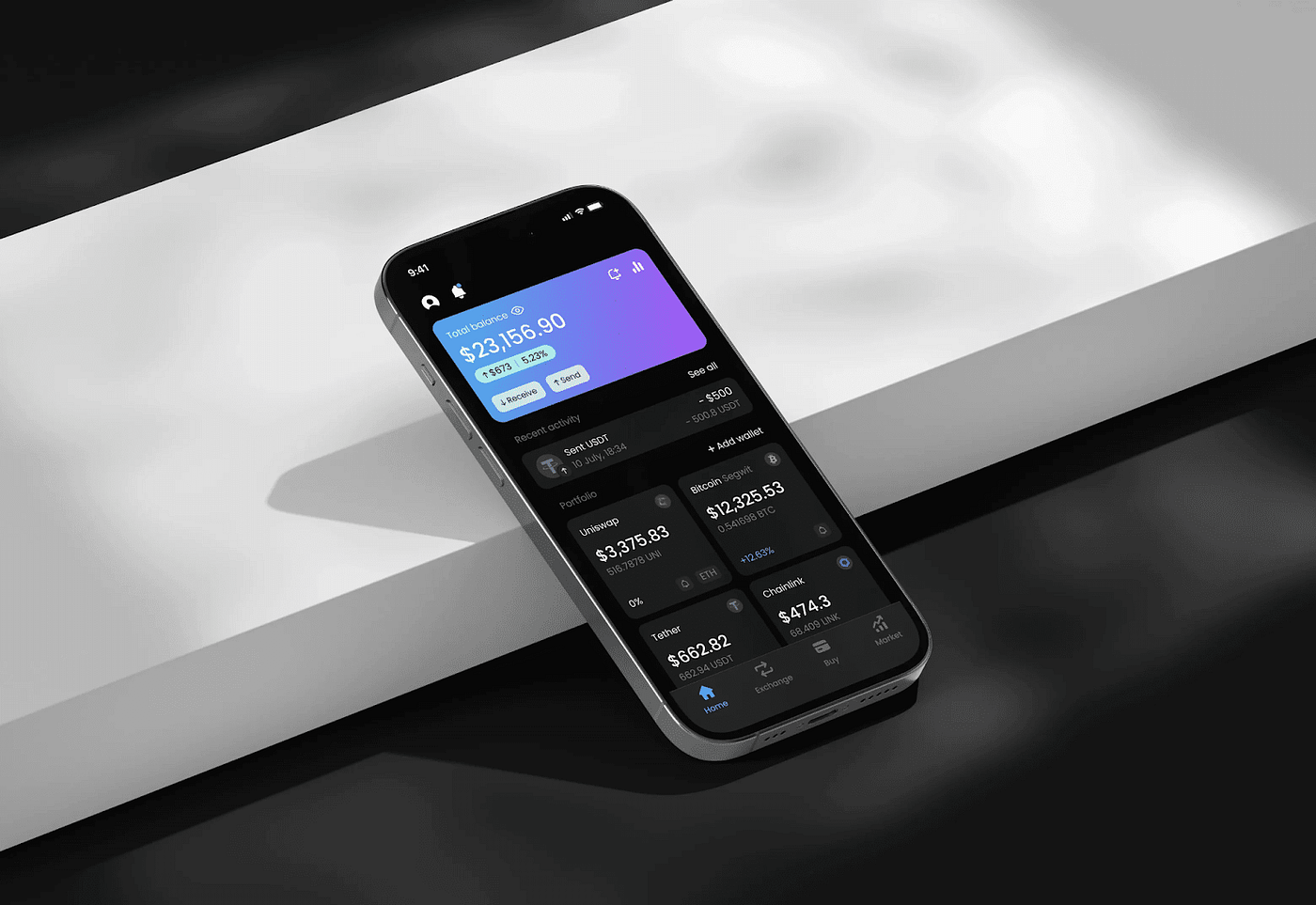 Noone Wallet
Noone Wallet
Type: Software wallet (hot wallet)
Price: Free
Supported Cryptocurrencies: Over 1,000 cryptocurrencies on 10+ blockchains
Entering the world of cryptocurrencies, Noone Wallet emerges as more than a simple digital vault — it’s an innovative tool for investment. It provides a fortified platform for the secure storage of over 1,000 cryptocurrencies while empowering users to fine-tune their trading and investment strategies. Offering personalized notifications — available via push, SMS, and email alerts — alongside detailed transaction histories and live charts, Noone Wallet is a source of valuable data for enhancing your investment approach.
At the heart of Noone Wallet is a potent and user-friendly interface that offers a safe haven for an array of digital currencies. The wallet’s non-custodial approach grants users full control over their private keys and forms the essence of its security emphasis. This focus on security is amplified by additional features such as biometric confirmation, PIN code usage, and customizable withdrawal limits. The wallet’s open-source core boosts trust and security by allowing anyone to review its code and contribute to it, ensuring potential vulnerabilities can be identified and rectified by the community.
Noone Wallet extends beyond being a digital safe, creating a single control hub where users can buy, sell, exchange, and hold more than 1,000 tokens across over 10 blockchains. This capability is elevated by the wallet’s partnerships with top decentralized exchange aggregators and market makers, which facilitates trading at the best rates and swapping ERC-20 tokens for the lowest fees.
How to Choose the Best Crypto Wallet
Entering the world of cryptocurrency involves critical decisions, and choosing an appropriate crypto wallet is certainly among them. A crypto wallet is a key digital tool for securely storing and managing cryptocurrencies when navigating the crypto space. The variety, from hardware wallets to mobile and desktop wallets, can be overwhelming. This guide explores essential factors and considerations in selecting a crypto wallet, discussing wallet types, security features, user-friendliness, and other important aspects to help you make an informed decision. The right choice is crucial for the safety and accessibility of your digital assets, ensuring your crypto transactions and crypto holdings are well-managed.
Security: The Foundation of Crypto Wallets
Security is paramount in the world of cryptocurrencies. Due to the decentralized nature of blockchain technologies, lost or stolen crypto assets are often irretrievable. To protect against cyber attacks and ensure the safety of your assets, look for these key security features in a crypto wallet:
- Private Key Control: Opt for a wallet that allows you full control over your private keys, giving you complete authority over your cryptocurrencies.
- Two-Factor Authentication (2FA): This security measure adds a layer beyond your password, requiring confirmation through a code sent to a personal device like your phone or via your email address.
- Recovery Option: Should you lose your device or forget your password, a recovery option, such as recovery phrases or backup solutions, is essential.
- Adherence to Security Protocols: A robust wallet follows stringent security protocols, including end-to-end encryption, multi-signature support, and regular software updates, safeguarding your wallet’s private keys.
Understanding Fees in Crypto Wallets
Various fees are associated with blockchain transactions and the maintenance of wallets. These include:
- Blockchain Transaction Fees: These vary based on network congestion and the transaction’s size.
- Hot Wallet Fees: Wallets like Exodus may include fees dependent on the provider and the transaction type.
- Cold Wallet Costs: Physical hardware wallets often have an initial purchase cost, varying by brand and features. Additional costs can include transfer fees and expenses for software updates or repairs.
Hot Wallets vs. Cold Wallets: A Comparative Perspective
Hot wallets and cold wallets serve the same purpose but differ significantly in terms of security, accessibility, and cost. Hot wallets, including software wallets and online wallet options, are digital and internet-connected, offering convenience and ease of access but less security. In contrast, cold wallets are physical, offline devices providing higher security levels but less convenience. Hot wallets often come free or at a low cost, making them a popular choice, whereas cold wallets require an initial investment in a physical device.
Ease of Use: The Hot Wallet Advantage
Hot wallets are typically more user-friendly than cold wallets due to their digital nature and accessibility. They are available through various platforms, including browser extensions, mobile apps, and computer software, making them an excellent choice in the crypto market for individuals who need frequent and easy access to their digital assets.
Trading Volume: A Critical Consideration
When planning your trading activities, consider the wallet’s support for various digital assets and restrictions on trading volume or frequency. For substantial trading volumes, a cold wallet, such as a hardware wallet from a reputable wallet provider, might be preferable because of its enhanced security features.
Diversity in Cryptocurrency Support
Modern wallets like Exodus, Coinomi, and Jaxx support a broad range of cryptocurrencies. When choosing a wallet, pay attention to the number of cryptocurrencies it works with to ensure you can conveniently manage and store various assets, including crypto tokens, in one place.
Customer Support: An Essential Aspect
The level of customer support for crypto users varies among wallet providers. Beginners and experienced users alike can benefit from robust customer support, including live chat, email, and sometimes phone assistance. Therefore, when selecting a wallet for further cryptocurrency management, consider the customer support level as a key factor in ensuring a smooth and secure user experience.
Types of Crypto Wallets
There are 3 main types of crypto wallets you can choose from. This decision greatly depends on your specific needs, trading habits, and desired level of security.
Hot Wallets
Hot wallets are crypto wallets that require an internet connection to operate. These include online wallets (accessed via a web browser), mobile wallets (smartphone apps), and desktop wallets (downloaded and installed on your computer).
Pros:
- Easy to use
- Quick transactions
- Suitable for beginners
Cons:
- Vulnerable to online attacks
- Less secure than cold wallets
Cold Wallets
Cold wallets, also known as hardware wallets, store your cryptocurrencies offline. They are less prone to hacks as they are disconnected from the internet.
Learn more about cold wallets and see our list of best cold wallets in this dedicated article.
Pros:
- Highly secure
- Ideal for large holdings
- Suitable for long-term storage
Cons:
- Less convenient for frequent transactions
- Cost more than hot wallets
Paper Wallets
Paper wallets involve printing out your public and private keys on a piece of paper, which is then stored in a secure place.
Pros:
- Safe from online hacks
- Cost-effective
Cons:
- Can be easily lost or damaged
- Not user-friendly
Best Bitcoin Wallets for 2024: Ideal for Every Crypto Investor
As Bitcoin continues to lead the cryptocurrency world, it’s important to choose the right wallet for storing and managing it. Here’s a look at some of the best and most popular wallets for Bitcoin in 2024, each catering to a range of needs from beginner-friendly interfaces to advanced security features:
- Exodus Wallet: Known as a user-friendly non-custodial wallet, Exodus Wallet supports not only Bitcoin but also Ethereum and several other cryptocurrencies. Its interface is straightforward, making it a top choice for beginners, yet it also offers the features that advanced users look for. The wallet includes a built-in exchange feature, which enhances its appeal.
- Coinbase: This platform is a centralized exchange that stands out in the cryptocurrency market for its secure and user-friendly mobile app and web interface. It’s not just for storing Bitcoin; Coinbase also offers secure storage for a variety of other cryptocurrencies and includes staking features for certain assets.
- Trust Wallet: A decentralized wallet, Trust Wallet supports an extensive range of cryptocurrencies, including Bitcoin. It’s a popular choice among users for its advanced security features and convenient built-in dApp browser, which allows for effortless exploration of decentralized applications.
- Ledger Nano X: For crypto investors looking for advanced security features, the Ledger Nano X is an ideal choice. This hardware wallet, supporting Bitcoin and many other cryptocurrencies, ensures the high-level security of your digital assets. It’s equipped with Bluetooth connectivity and a comprehensive mobile app, making it convenient for managing assets securely.
These wallets cater to various preferences, whether you’re looking for a non-custodial wallet, a secure platform by a centralized exchange, or a wallet with advanced features for experienced investors. Each provides a secure and user-friendly way to manage Bitcoin and other digital currencies in 2024.
For a more detailed analysis of Bitcoin wallets, we invite you to read our in-depth article dedicated to the best BTC wallets.
How to Get & Use a Cryptocurrency Wallet
Getting started with a cryptocurrency wallet involves a few steps: choosing the right wallet, installing it, understanding how to use it, and familiarizing yourself with important concepts like keys and addresses. Here’s a step-by-step guide to help you grasp it:
1. Choose a Cryptocurrency Wallet
Select one that suits your needs from the list of the best crypto wallets. Think of factors like security, ease of use, and the cryptocurrencies you plan to use. For instance, Exodus and Coinbase are great for beginners, while Ledger Nano X offers more advanced security for experienced users.
2. Install the Wallet
- Mobile/Desktop Wallets (e.g., Exodus, Coinbase):
- For mobile devices, download the wallet app from the App Store (iOS) or Google Play Store (Android).
- For desktop, download the installation file from the official website and run it on your computer.
- Follow the onscreen instructions to complete the installation.
- Hardware Wallets (e.g., Ledger Nano X):
- Connect the hardware wallet to your computer.
- Download and install the required software from the official website.
- Set up the device following the instructions provided.
3. Set Up Your Wallet
- Create an account or a wallet by providing the necessary information.
- Secure Your Wallet:
- Set a strong password.
- Write down the recovery phrase (a series of words given during setup) and store it securely. This phrase is crucial for recovering your wallet if you lose access.
- Consider enabling two-factor authentication (2FA) for added security.
4. Understanding Keys and Addresses
- Private Key: This is like the password to your wallet. It’s a long string of letters and numbers that allows you to access and control your crypto funds. Never share your private key with anyone.
- Public Address: This is similar to your bank account number. You share this address with others to receive funds. It’s a long string of letters and numbers generated from your private key, but it’s safe to share it publicly.
5. Receive Cryptocurrency
- To receive crypto, go to the Receive section in your wallet.
- Select the cryptocurrency you want to receive.
- The wallet will generate a public address (or QR code). Share it with the sender.
- The sender will use this address to transfer crypto to your wallet.
6. Send Cryptocurrency
- Go to the Send section in your wallet.
- Enter or scan the recipient’s public address.
- Input the amount of cryptocurrency you want to send.
- Double-check the details and confirm the transaction.
- The funds will be transferred from your wallet to the recipient’s address.
7. Monitor Your Transactions
- Most wallets have a transaction history.
- Check this regularly to keep track of incoming and outgoing transactions.
Additional Tips
- Backup Regularly: Ensure your wallet and recovery phrases are backed up.
- Stay Updated: Keep your wallet software up to date for the latest security features.
- Be Cautious: Be wary of phishing scams and never share your private key or recovery phrase with anyone.
By following these steps, you’ll be well-equipped to use a cryptocurrency wallet, make transactions, and manage your digital assets securely. Remember, the world of cryptocurrency can be complex, so take your time to understand each step.
Choosing the Best Crypto Wallet: Frequently Asked Questions
What kind of crypto wallet is best?
Crypto wallets come in two primary types: hot and cold. Hot wallets, including online and mobile versions, offer internet connectivity for ease of access and are ideal for regular transactions. However, they’re more prone to security risks. Cold wallets, like hardware or paper wallets, keep your crypto offline, enhancing security at the cost of accessibility.
For optimal balance, consider combining hot and cold wallets. Use a cold wallet, such as a hardware wallet, for long-term storage or staking, while a software wallet can handle daily transactions.
In summary, the ideal crypto wallet depends on your specific needs. For a mix of security and convenience, integrating various wallet types is advisable for different use cases.
Why do you need a crypto wallet?
A crypto wallet is vital for the safe storage and management of digital currencies and for keeping tabs on your cryptocurrency investments. Its main role is to protect private keys, essential for accessing cryptocurrencies and transacting with them. Without a secure wallet, these keys and, consequently, your digital assets could be at risk.
Crypto wallets also offer functionalities like sending/receiving funds, secure storage, and token swapping, making them indispensable in the cryptocurrency sphere. In short, for anyone involved in digital currencies, a crypto wallet is a necessary tool for safely managing transactions and investments.
Which crypto wallet is safest?
In the realm of crypto wallets, cold wallets are generally safer than hot wallets due to their offline storage capabilities. Trezor is often recognized as the safest option in the market. Users can take advantage of its online web wallet (accessible on both desktop and mobile devices) or downloadable desktop Trezor Suite app.
Among hot wallets, the Coinbase wallet is notable for its ease of use and security. It stands out as a reliable option for those who prefer online wallets.
Disclaimer: Please note that the contents of this article are not financial or investing advice. The information provided in this article is the author’s opinion only and should not be considered as offering trading or investing recommendations. We do not make any warranties about the completeness, reliability and accuracy of this information. The cryptocurrency market suffers from high volatility and occasional arbitrary movements. Any investor, trader, or regular crypto users should research multiple viewpoints and be familiar with all local regulations before committing to an investment.
13
1
Cryptocurrency
Crypto Wallet
Bitcoin
Metamask
2024
13
1
 Follow
Follow
Written by MrNouman
142 Followers
·
Writer for
Coinmonks
Programming, Cryptocurrency, Technology etc.
More from MrNouman and Coinmonks

 MrNouman
MrNouman
in
Coinmonks
Best Crypto to Buy Now
In today’s digital age, an increasing number of individuals and businesses are diving into the digital asset economy, prompting many to…
47 min read
·
Dec 22, 2023
83
2
 Shantanu Gupta
Shantanu Gupta
in
Coinmonks
Which Crypto Will Explode in 2024? Here Are Some Of MyTop Picks.
As we approach the end of the year, investors worldwide are gearing up for the anticipated bull run in the crypto market, eyeing the next…
4 min read
·
Dec 19, 2023
668
2
 Velvet.Capital
Velvet.Capital
in
Coinmonks
🚨Velvet.Capital Token Distribution (Airdrop)🚨
🚨 Airdrop Alert🚨: DeFi Asset Management Done right! Everything you need to know for Velvet.Capital’s Token Distribution & Airdrop!
4 min read
·
Dec 30, 2022
38K
1015
 MrNouman
MrNouman
in
Coinmonks
The 10 Best Altcoins to Buy in 2024
Altcoins have been making headlines in the cryptocurrency world as investors and traders look for the next big thing after Bitcoin. With so…
9 min read
·
Jan 6
60
1
Recommended from Medium

 Mike Coldman
Mike Coldman
Top 4 Crypto Gems Set to Explode in 2024 !
Unlock the Secret Strategies of Elite Investors and Transform Your Portfolio Overnight !
·
5 min read
·
Jan 8
170
3
 Aurora Grace
Aurora Grace
in
GamingArena
What are the 4 Cryptocurrency Predictions for 2024?
In the landscape of cryptocurrency, 2023 unfolded as a year of unprecedented growth and innovation. Bitcoin and Ethereum maintained their…
9 min read
·
Jan 4
80
1
Lists

 Modern Marketing52 stories
Modern Marketing52 stories
·
368
saves
 Generative AI Recommended Reading52 stories
Generative AI Recommended Reading52 stories
·
623
saves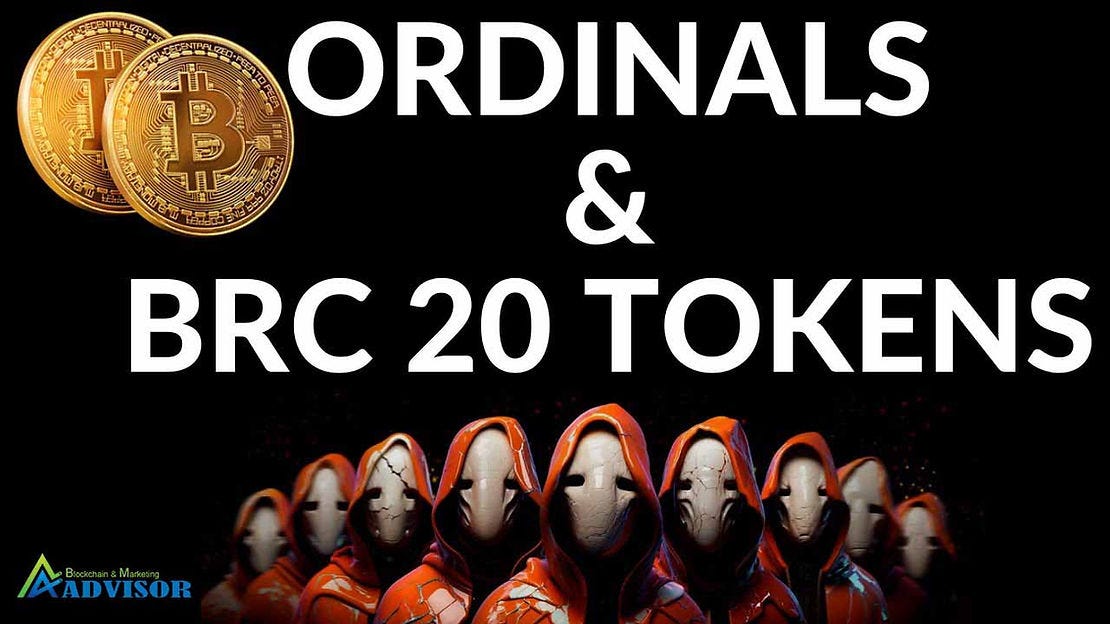
 Andrey Plat
Andrey Plat
Bitcoin Ordinals under the hood. How Inscriptions and BRC20 workIntroduction.
One of the most talked about narratives in recent weeks is tokens on the Bitcoin blockchain. It is so popular simply because it has already…
12 min read
·
Dec 25, 2023
153
2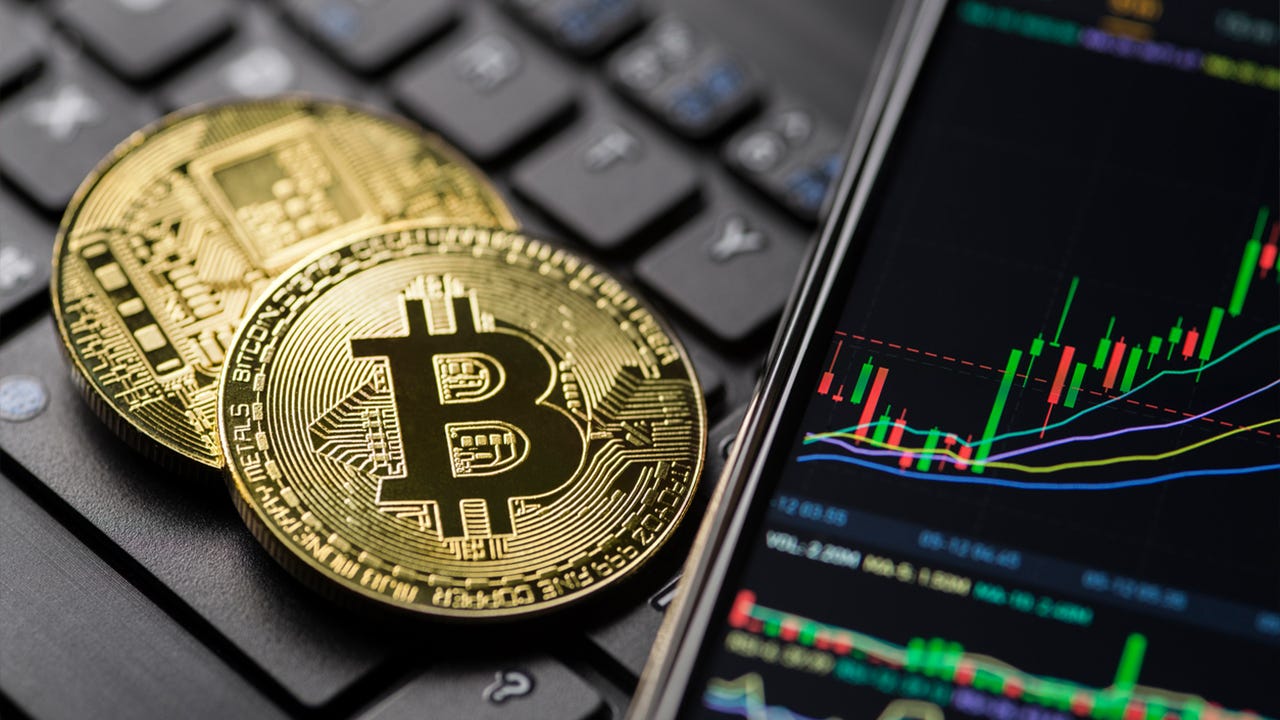
 Crypto Insider Talks
Crypto Insider Talks
How Do You Make $1000 A Month In Crypto Trading?
Intrigued by Lambos but terrified of “rekt”? Don’t worry, you’re not alone. The cryptosphere is a wild ride, promising moonshot gains one…
7 min read
·
Dec 19, 2023
1
 CryptoHunters100X.com
CryptoHunters100X.com
Crypto Hunters 100x Q4 Review
10 min read
·
Jan 3
60
 Prodigy Sniper Bot
Prodigy Sniper Bot
What is a Crypto Sniper Bot and how to snipe in crypto ?
The ultimate guide to understand what is a Sniper bot and how to use it.
15 min read
·
Dec 22, 2023
21






















![[LIVE] Engage2Earn: auspol follower rush](https://cdn.bulbapp.io/frontend/images/c1a761de-5ce9-4e9b-b5b3-dc009e60bfa8/1)















